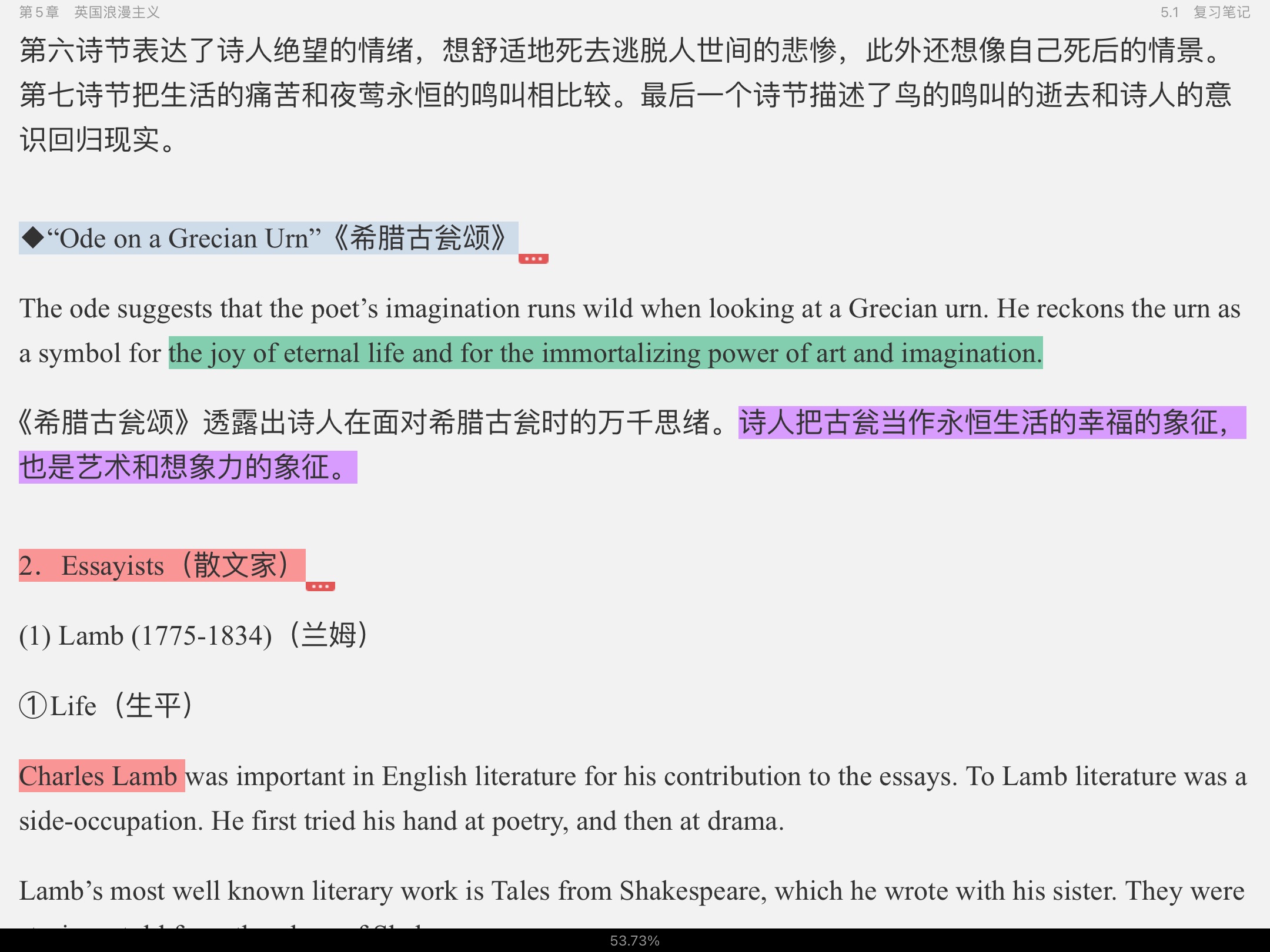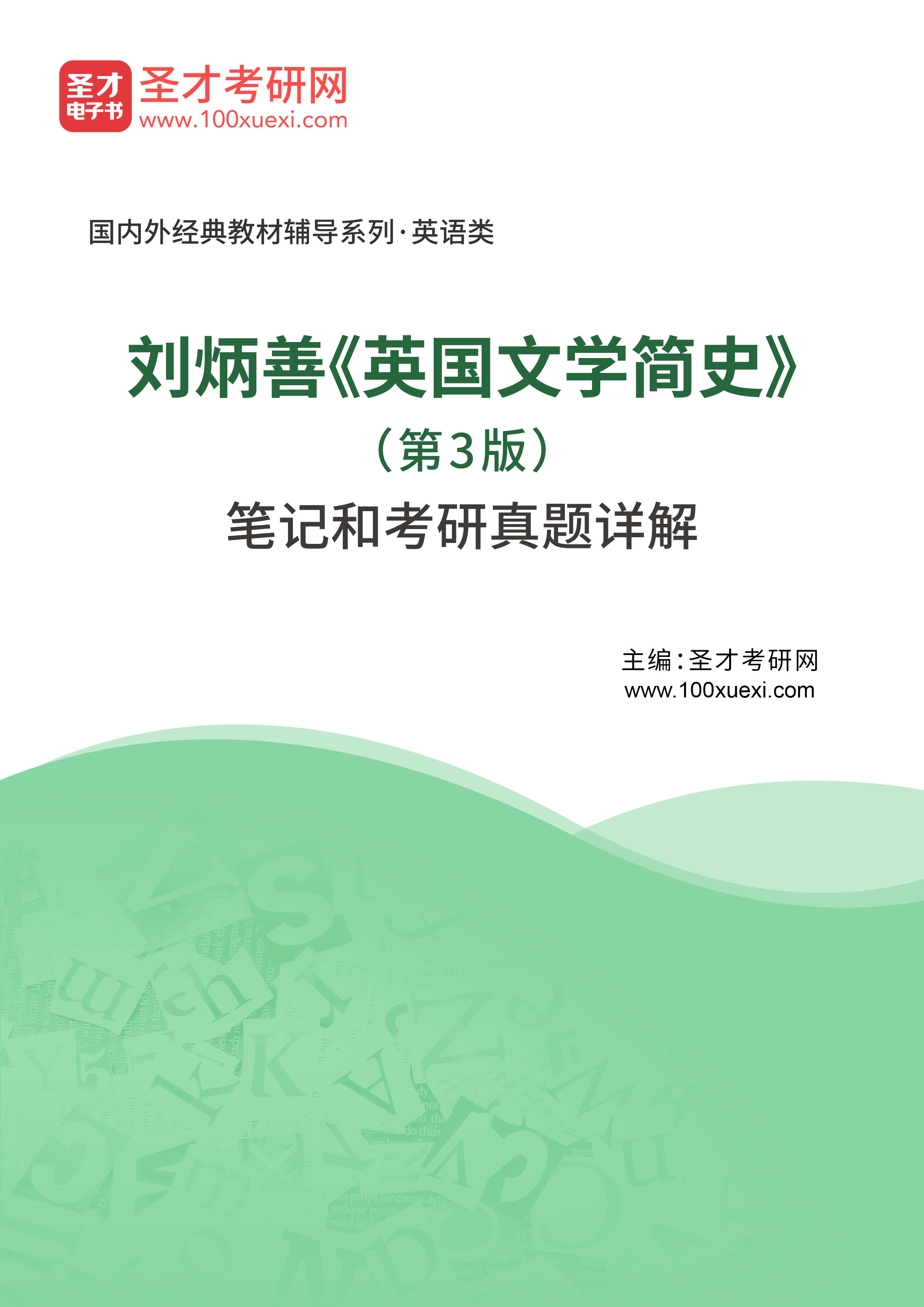时间: 2020-12-07 09:49:14 来自: iPad7,11
在“刘炳善《英国文学简史》(第3版)笔记和考研真题详解”的内容第619页备注了学习笔记
从歌咏的艺术对象看,诗人那观赏的目光转而对准了一个永恒不变的对象——希腊古瓮。这默然、冰冷但不乏艺术魅力的古代雕刻珍品,似乎向诗人透露出某种永恒的信息。命运赋予我们的太短暂,我们就像匆匆过客,赤条条无牵无挂的来,又孤零零心事重重的离开。\n\nOde on a Grecian Urn\n希腊古瓮颂\n\nTHOU still unravish\u0027d bride of quietness,\n你委身“寂静”的、完美的处子,\n\nThou foster-child of Silence and slow Time,\n受过了“沉默”和“悠久”的抚育,\n\nSylvan historian, who canst thus express\n呵,田园的史家,\n\nA flowery tale more sweetly than our rhyme:\n你竟能铺叙一个如花的故事,比诗还瑰丽:\n\nWhat leaf-fringed legend haunts about thy shape\n在你的形体上,岂非缭绕着古老的传说,\n\nOf deities or mortals, or of both,\n以绿叶为其边缘;\n\nIn Tempe or the dales of Arcady?\n讲着人,或神,敦陂或阿卡狄?\n\nWhat men or gods are these? What maidens loth?\n呵,是怎样的人,或神!\n\nWhat mad pursuit? What struggle to escape?\n在舞乐前多热烈的追求!少女怎样地逃躲!\n\nWhat pipes and timbrels? What wild ecstasy?\n怎样的风笛和鼓谣!怎样的狂喜!\n\nHeard melodies are sweet, but those unheard\n听见的乐声虽好,但若听不见却更美;\n\nAre sweeter; therefore, ye soft pipes, play on;\n所以,吹吧,柔情的风笛;\n\nNot to the sensual ear, but, more endear\u0027d,\n不是奏给耳朵听,而是更甜,\n\nPipe to the spirit ditties of no tone:\n它给灵魂奏出无声的乐曲;\n\nFair youth, beneath the trees, thou canst not leave\n树下的美少年呵,你无法中断你的歌,\n\nThy song, nor ever can those trees be bare;\n那树木也落不了叶子;\n\nBold Lover, never, never canst thou kiss,\n卤莽的恋人,你永远、永远吻不上,\n\nThough winning near the goal—yet, do not grieve;\n虽然够接近了——但不必心酸;\n\nShe cannot fade, though thou hast not thy bliss,\n她不会老,虽然你不能如愿以偿,\n\nFor ever wilt thou love, and she be fair!\n你将永远爱下去,她也永远秀丽!\n\nAh, happy, happy boughs! that cannot shed\n呵,幸福的树木!\n\nYour leaves, nor ever bid the Spring adieu;\n你的枝叶不会剥落,从不曾离开春天;\n\nAnd, happy melodist, unwearièd,\n幸福的吹笛人也不会停歇,\n\nFor ever piping songs for ever new;\n他的歌曲永远是那么新鲜;\n\nMore happy love! more happy, happy love!\n呵,更为幸福的、幸福的爱!\n\nFor ever warm and still to be enjoy\u0027d,\n永远热烈,正等待情人宴飨,\n\nFor ever panting, and for ever young;\n永远热情地心跳,永远年轻;\n\nAll breathing human passion far above,\n幸福的是这一切超凡的情态:\n\nThat leaves a heart high-sorrowful and cloy\u0027d,\n它不会使心灵餍足和悲伤,\n\nA burning forehead, and a parching tongue.\n没有炽热的头脑,焦渴的嘴唇。\n\nWho are these coming to the sacrifice?\n这些人是谁呵,都去赶祭祀?\n\nTo what green altar, O mysterious priest,\n这作牺牲的小牛,对天鸣叫,\n\nLead\u0027st thou that heifer lowing at the skies,\n你要牵它到哪儿,神秘的祭司?\n\nAnd all her silken flanks with garlands drest?\n花环缀满着它光滑的身腰。\n\nWhat little town by river or sea-shore,\n是从哪个傍河傍海的小镇,\n\nOr mountain-built with peaceful citadel,\n或哪个静静的堡寨山村,\n\nIs emptied of its folk, this pious morn?\n来了这些人,在这敬神的清早?\n\nAnd, little town, thy streets for evermore\n呵,小镇,你的街道永远恬静;\n\nWill silent be; and not a soul, to tell\n再也不可能回来一个灵魂告诉人,\n\nWhy thou art desolate, can e\u0027er return.\n你何以是这么寂寥。\n\nO Attic shape! fair attitude! with brede\n哦,希腊的形状!唯美的观照!\n\nOf marble men and maidens overwrought,\n哦,希腊的形状!唯美的观照!\n\nWith forest branches and the trodden weed;\n上面缀有石雕的男人和女人,还有林木,和践踏过的青草;\n\nThou, silent form! dost tease us out of thought\n沉默的形体呵,你象是“永恒”使人超越思想:\n\nAs doth eternity: Cold Pastoral!\n呵,冰冷的牧歌!\n\nWhen old age shall this generation waste,\n等暮年使这一世代都凋落,只有你如旧;\n\nThou shalt remain, in midst of other woe\n在另外的一些忧伤中,\n\nThan ours, a friend to man, to whom thou say\u0027st,\n你会抚慰后人说:\n\n\u0027Beauty is truth, truth beauty,—that is all\n“美即是真,真即是美,”\n\nYe know on earth, and all ye need to know.\n这就包括你们所知道、和该知道的一切。◆“Ode on a Grecian Urn”《希腊古瓮颂》
点击查看资料全文:前往在线阅读下载全文

用户小玫瑰正在学习的资料简介:
刘炳善《英国文学简史》(第3版)笔记和考研真题详解

手机扫码阅读全文
第1章 早期和中世纪的英国文学
1.1 复习笔记
1.2 考研真题与典型题详解
第2章 英国文艺复兴
2.1 复习笔记
2.2 考研真题与典型题详解
第3章 英国资产阶级革命时期
3.1 复习笔记
3.2 考研真题与典型题详解
第4章 十八世纪的英国文学
4.1 复习笔记
4.2 考研真题与典型题详解
第5章 英国浪漫主义
5.1 复习笔记
5.2 考研真题与典型题详解
第6章 英国批判现实主义
6.1 复习笔记
6.2 考研真题与典型题详解
第7章 19世纪中后期的散文家和诗人
7.1 复习笔记
7.2 考研真题与典型题详解
第8章 二十世纪英国文学
8.1 复习笔记
8.2 考研真题与典型题详解
第9章 二战前后的诗人和小说家
9.1 复习笔记
9.2 考研真题与典型题详解
